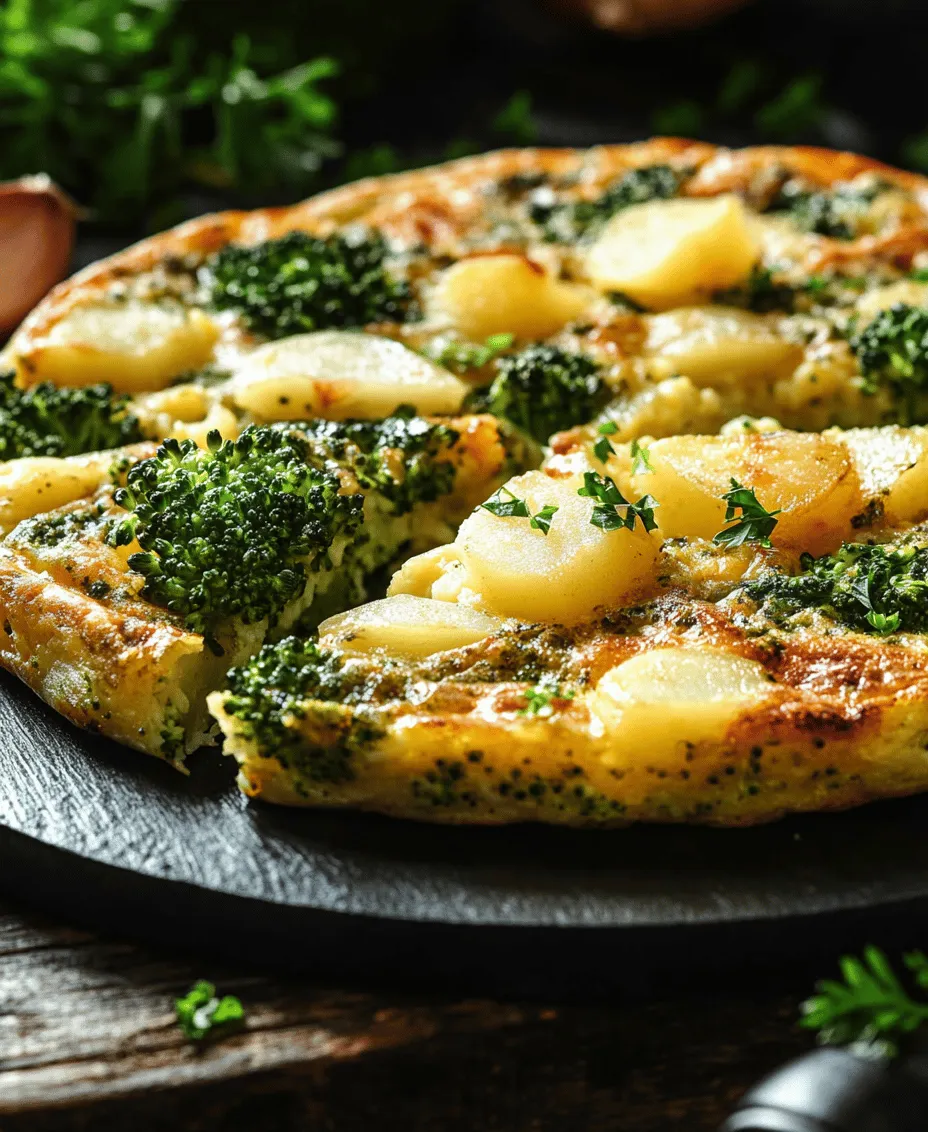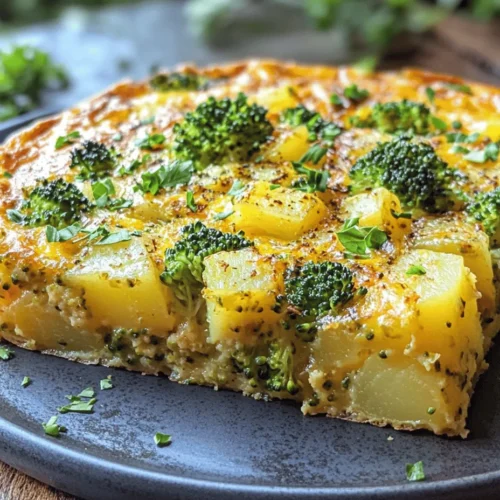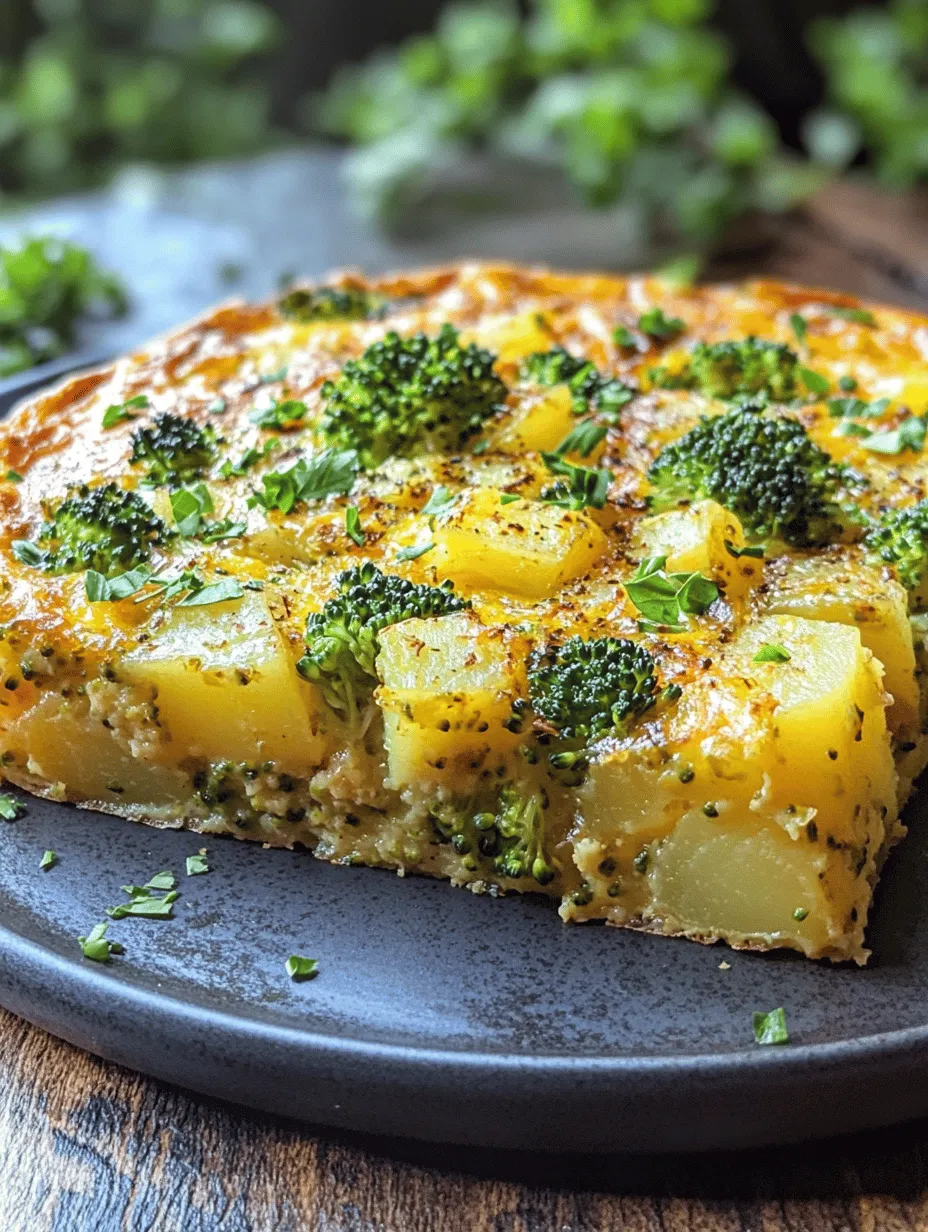Introduction to Broccoli and Potato Frittata
When it comes to versatile dishes that can be enjoyed for breakfast, lunch, or dinner, few compare to the frittata. This Italian classic is not only simple to prepare but also incredibly adaptable, allowing you to incorporate a wide variety of ingredients based on your taste preferences and dietary needs. Today, we’ll take a closer look at a delicious and nutritious version that combines the goodness of broccoli and potatoes into a satisfying frittata that will delight any palate.
In addition to being tasty, this frittata is packed with essential nutrients thanks to its star ingredients: broccoli and potatoes. Broccoli, known for its vibrant green color and crunchy texture, is a powerhouse of vitamins, particularly vitamin C and K, while also providing dietary fiber. Potatoes, often viewed as a comfort food, offer a hearty texture and are a good source of potassium and vitamin B6. Together, these ingredients create a dish that not only satisfies hunger but also nourishes the body.
As we dive into the recipe, you’ll discover how easy it is to whip up this frittata in your own kitchen, impressing family and friends with minimal effort. Whether you’re looking for a quick weeknight dinner or a brunch option that will wow your guests, the broccoli and potato frittata is a perfect choice.
Understanding Frittatas: A Brief History
So, what exactly is a frittata? A frittata is an Italian egg dish that is similar to an omelet but with some key differences. While an omelet is typically cooked on the stovetop and folded over its fillings, a frittata is cooked slowly, often started on the stovetop and finished in the oven. This technique allows for a more even cooking process and results in a thicker, more substantial dish that can hold a variety of ingredients.
The origins of the frittata can be traced back to Italy, where it has been enjoyed for centuries. The term “frittata” comes from the Italian verb “friggere,” which means “to fry,” referring to the initial cooking method used to prepare the dish. Frittatas have been a staple in Italian cuisine, often made with leftover ingredients, making them a practical choice for using up what’s available.
Frittatas hold cultural significance in various cuisines around the world. In Spain, for instance, a similar dish known as “tortilla española” is made primarily with potatoes and onions, while in France, the “quiche” offers a pastry crust filled with eggs and various fillings. Although these dishes may vary in preparation and presentation, they all share a common theme: the use of eggs as a primary ingredient that serves as a canvas for flavors.
Nutritional Benefits of Key Ingredients
Broccoli
Broccoli is not only a vibrant and crunchy vegetable but also a nutritional superstar. It is rich in vitamins C and K, both of which play essential roles in maintaining overall health. Vitamin C is crucial for immune function, while vitamin K is important for bone health and proper blood clotting. Furthermore, broccoli is an excellent source of dietary fiber, which aids in digestion and promotes feelings of fullness. With its high antioxidant content, broccoli also helps combat oxidative stress in the body, making it a powerful addition to any meal.
Potatoes
Often regarded as a comfort food, potatoes are more than just a delicious side dish. They are a great source of complex carbohydrates, providing energy to fuel your day. Potatoes are also rich in potassium, which is vital for maintaining proper muscle and nerve function. Additionally, they contain vitamin B6, which plays a role in brain health and metabolism. When included in a frittata, potatoes add a hearty texture that balances the lightness of the eggs and the freshness of the broccoli.
Eggs
Eggs are often hailed as a nutritional powerhouse, and for good reason. They are an excellent source of high-quality protein, providing all nine essential amino acids necessary for bodily function. Eggs also contain healthy fats, particularly omega-3 fatty acids, which are beneficial for heart health. Furthermore, eggs are rich in vitamins D and B12, both of which are important for bone health and energy production, respectively. Including eggs in your frittata not only enhances its flavor but also boosts its nutritional profile.
Optional Ingredients
To elevate your broccoli and potato frittata, consider adding optional ingredients such as cheese, milk, and fresh herbs. Cheese can introduce a creamy texture and a burst of flavor, with varieties like cheddar, feta, or goat cheese all complementing the dish beautifully. Milk or cream can be whisked into the egg mixture to create a richer, fluffier frittata. Fresh herbs, such as parsley, basil, or chives, can provide a refreshing finish, enhancing the overall taste and presentation of the dish.
Ingredients Breakdown
When it comes to making a scrumptious broccoli and potato frittata, quality ingredients are key. Here’s a comprehensive list of what you’ll need, along with possible substitutions for each:
– Eggs: 6 large eggs (You can use egg substitutes or egg whites for a lighter version.)
– Broccoli: 1 cup of chopped broccoli (Feel free to substitute with spinach, kale, or any seasonal greens.)
– Potatoes: 2 medium-sized potatoes, peeled and diced (Sweet potatoes or other root vegetables work well as alternatives.)
– Onion: 1 medium onion, finely chopped (Shallots or leeks can be used for a milder flavor.)
– Garlic: 2 cloves of garlic, minced (Shallots or garlic powder can be substituted if necessary.)
– Cheese: 1 cup of shredded cheese (Cheddar, mozzarella, or feta are great options; omit for a dairy-free version.)
– Milk: 1/4 cup of milk or cream (You can use plant-based milk for a dairy-free frittata.)
– Olive Oil: 2 tablespoons of olive oil (Butter or another cooking oil can be used instead.)
– Salt and Pepper: To taste (Feel free to add your favorite spices or herbs for extra flavor.)
Using fresh ingredients elevates the flavor of your frittata, so it’s worth taking the time to source high-quality produce. Additionally, consider seasonal variations; frittatas are incredibly versatile, and you can experiment with different vegetables based on what’s available at your local market.
Step-by-Step Instructions for a Perfect Broccoli and Potato Frittata
To create a delectable broccoli and potato frittata, follow these step-by-step instructions for a flawless result:
Preheating the Oven
Before you begin cooking, it’s essential to preheat your oven to 375°F (190°C). This ensures that the frittata cooks evenly and achieves a beautiful golden-brown top. Proper temperature control is crucial for baking; if the oven is not hot enough, the frittata may turn out undercooked or soggy.
Cooking the Potatoes
Start by preparing the potatoes. Peel and dice them into small cubes for even cooking. In a large, oven-safe skillet, heat 1 tablespoon of olive oil over medium heat. Once the oil is shimmering, add the diced potatoes and season with salt and pepper. Cook the potatoes for about 10-12 minutes, stirring occasionally, until they are tender and golden brown on the outside. The key is to achieve a balance between a crispy exterior and a soft interior, adding a delightful texture to the frittata.
Sautéing Onions and Garlic
While the potatoes are cooking, take the opportunity to enhance the flavor profile of your frittata by sautéing onions and garlic. In the same skillet with the cooked potatoes, add another tablespoon of olive oil if needed, followed by the chopped onion. Sauté for about 3-4 minutes until the onions are translucent and fragrant. Next, add the minced garlic and continue to cook for an additional minute, being careful not to burn it. The aroma of sautéed onions and garlic will create a delicious foundation for your frittata.
As you proceed with the recipe, you’ll find that each step builds on the last, contributing to a final dish that is not only nourishing but also incredibly satisfying. In the following sections, we’ll dive deeper into the remaining steps, ensuring you achieve the perfect broccoli and potato frittata that will be a hit at any meal.

Incorporating Broccoli: Techniques for Maintaining Color and Nutrients
When it comes to incorporating broccoli into your frittata, the key is to ensure it retains its vibrant green color and essential nutrients. Start by blanching the broccoli before adding it to the egg mixture. To do this, bring a pot of salted water to a boil and add the chopped broccoli florets for about two to three minutes. This quick cooking method softens the broccoli slightly without losing its crunch or color. Immediately transfer the broccoli to an ice bath to stop the cooking process, ensuring it remains bright and retains its nutrients. Once cooled, drain the broccoli well and set it aside to be combined with the egg mixture.
Preparing the Egg Mixture: Achieving the Ideal Consistency
For a perfect frittata, the egg mixture must be well-prepared to achieve the right consistency. In a large mixing bowl, crack six large eggs and whisk them thoroughly until the yolks and whites are completely blended. Season the eggs with a pinch of salt and freshly ground black pepper. For added richness, consider incorporating a splash of milk or cream—this not only enhances the flavor but also contributes to a creamier texture. Whisk until frothy, as this helps introduce air into the mixture, resulting in a fluffier frittata. Once your egg mixture is ready, gently fold in the prepared broccoli and any additional ingredients like cooked potatoes, cheese, or herbs.
Combining Ingredients: Ensuring Even Distribution for Cooking
To ensure a uniformly cooked frittata, it’s essential to combine the ingredients evenly. Start by incorporating the broccoli into the egg mixture gently; use a spatula or wooden spoon to fold the ingredients together. If you are using potatoes—preferably cooked and diced—add them at this stage so they are evenly dispersed throughout. This distribution is key to achieving consistent cooking and flavor in every bite. If you decide to add cheese, consider grating it finely for better melting and even distribution. Once everything is well combined, your mixture will be ready for cooking.
Cooking on the Stovetop: How to Monitor Doneness
Begin the cooking process by heating a large oven-safe skillet over medium heat. Add a tablespoon of olive oil or butter, allowing it to coat the pan evenly. Once the oil is hot and shimmering, pour the egg and vegetable mixture into the skillet. Allow it to cook undisturbed for about 5 to 7 minutes. During this time, gently shake the pan occasionally to prevent sticking and ensure even cooking. As the edges start to set, use a spatula to lift them slightly, allowing any uncooked egg to flow to the bottom. The center should remain slightly jiggly; this indicates that it’s time to transition to the oven for the final cooking stage.
Baking in the Oven: Understanding the Timing for a Perfect Frittata
Preheat your oven to 350°F (175°C) before you pour the frittata mixture into the skillet. Once you’ve allowed the stovetop cooking to progress, transfer the skillet to the preheated oven. Bake the frittata for about 10 to 15 minutes, or until it is puffed up and a toothpick inserted into the center comes out clean. Be careful not to overbake, as this can lead to a dry frittata. The surface should be set but still moist. Keep a close eye on it towards the end of the cooking time to ensure it achieves that perfect golden hue without burning.
Cooling and Serving: Presentation Tips for an Appealing Dish
Once your frittata is cooked to perfection, carefully remove it from the oven and let it cool for about 5 minutes. This resting period allows the frittata to set, making it easier to slice. For an appealing presentation, consider garnishing the top with a sprinkle of fresh herbs, such as parsley or chives. This not only adds color but also enhances the flavor. When ready to serve, use a sharp knife to slice the frittata into wedges or squares. For an elegant touch, serve it on a beautiful platter, or for a more casual approach, individual portions can be plated directly onto plates.
Serving Suggestions and Pairings
The versatility of a broccoli and potato frittata makes it suitable for various occasions. Whether serving it for breakfast, brunch, or a light dinner, this dish shines on any table. Pair it with a simple side salad dressed with vinaigrette for a refreshing contrast, or serve it alongside roasted tomatoes or sautéed greens for a wholesome meal.
For beverages, consider offering freshly squeezed orange juice or a light herbal tea to complement the flavors of the frittata. If you’re hosting a brunch, sparkling water or a mimosa can elevate the dining experience. For a creative serving idea, consider presenting the frittata family-style, allowing guests to help themselves, or serve it in individual portions for a more formal setting.
Storing and Reheating Leftovers
If you find yourself with leftovers, storing them properly is essential to retain the flavor and texture of the frittata. Allow the frittata to cool completely, then transfer it to an airtight container. It can be stored in the refrigerator for up to four days. For longer storage, consider freezing portions wrapped tightly in plastic wrap and then placed in a freezer-safe bag. This method keeps the frittata fresh for up to three months.
When it comes to reheating, you have a couple of options. For the best results, reheat individual slices in the oven at 350°F (175°C) for about 10-15 minutes until warmed through. Alternatively, you can use the microwave, heating each slice on medium power for about 1-2 minutes, but be cautious as this method can sometimes result in a rubbery texture. If you have leftovers, consider repurposing them into a breakfast burrito, adding some salsa, or mixing them into a salad for a quick lunch option.
Variations to Try
The beauty of a frittata lies in its adaptability. Feel free to explore different vegetable combinations based on what’s in season or what you have on hand. Spinach, bell peppers, or zucchini can be delightful alternatives to broccoli. For added protein, consider incorporating diced bacon, ham, or even tofu for a vegetarian option.
Flavor enhancements can also take your frittata to the next level. Experiment with spices such as smoked paprika, cumin, or fresh herbs like basil or dill to create unique flavor profiles. Cheese lovers can try different varieties—like feta, goat cheese, or cheddar—to find their perfect match. Each variation opens the door to a new culinary experience, ensuring that your frittata never becomes boring.
Conclusion: The Versatility of Broccoli and Potato Frittata
In summary, the broccoli and potato frittata is a fantastic dish that highlights the versatility and depth of flavors that can be achieved in a simple recipe. Packed with nutrients and flavor, it serves as a perfect meal any time of day, fitting seamlessly into a balanced diet. Whether you’re enjoying it fresh out of the oven or utilizing leftovers in creative ways, this frittata showcases the joy of cooking and the pleasure of sharing meals with loved ones.
Don’t hesitate to explore various ingredients and cooking techniques to make this recipe your own. The world of frittatas is vast and delicious, inviting you to experiment and discover new combinations that suit your taste. Embrace the creativity in the kitchen and enjoy the process of cooking, knowing that each meal is an opportunity to connect with others and celebrate the joys of good food.



